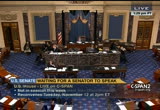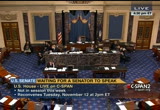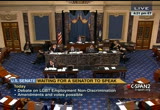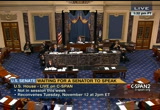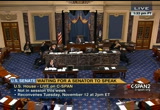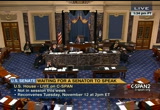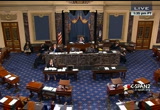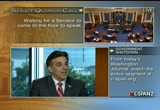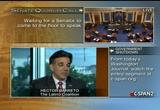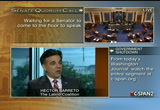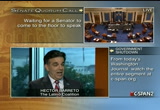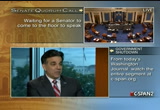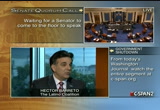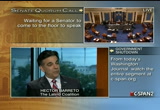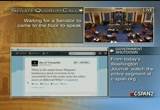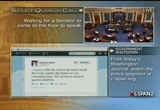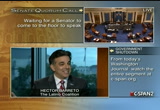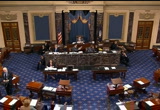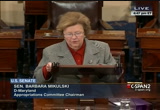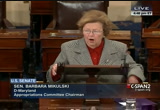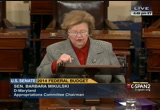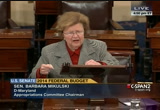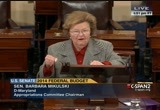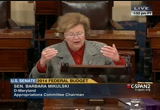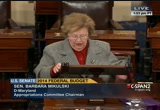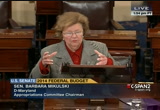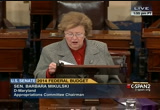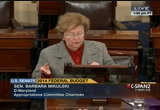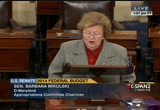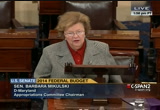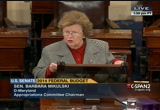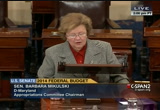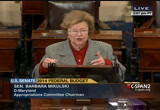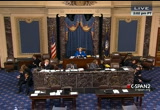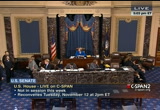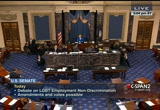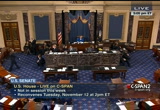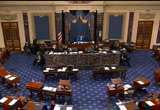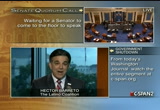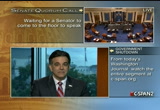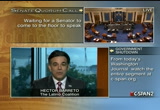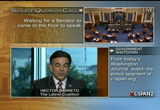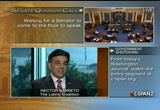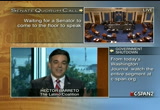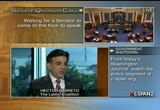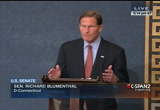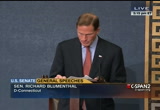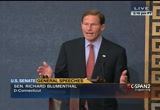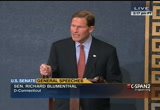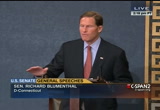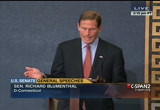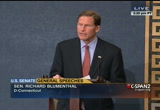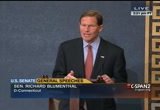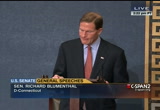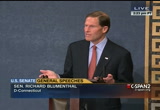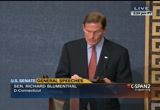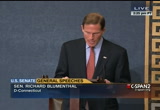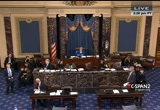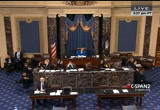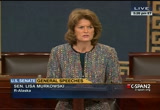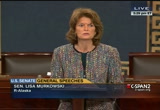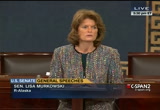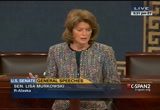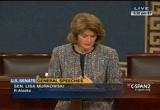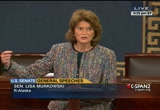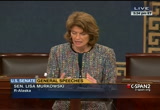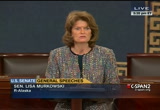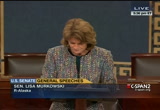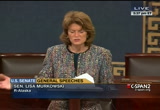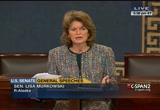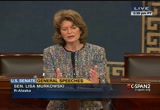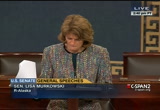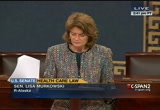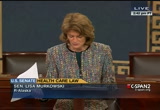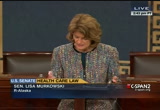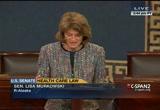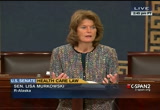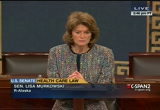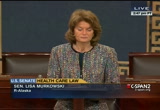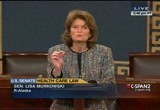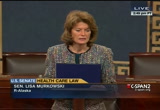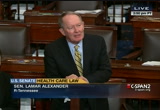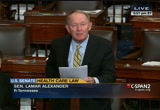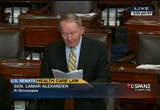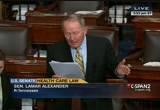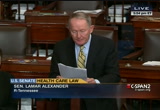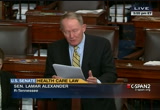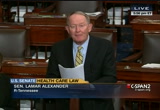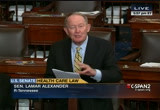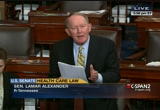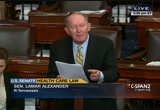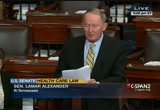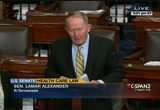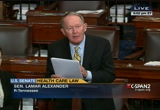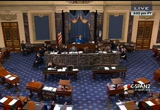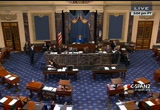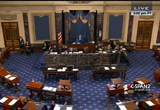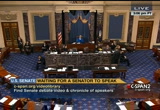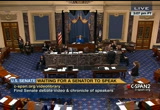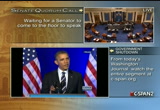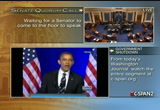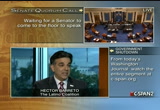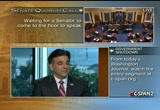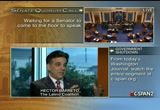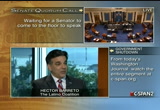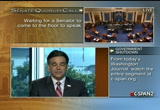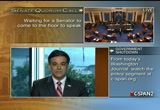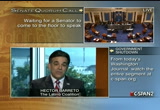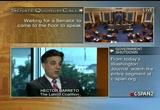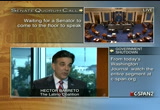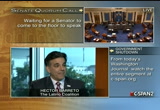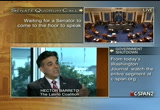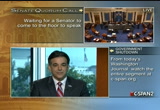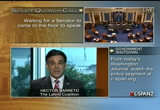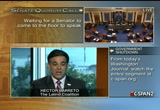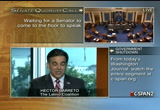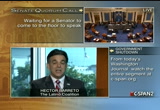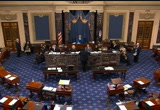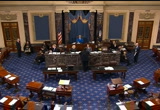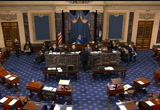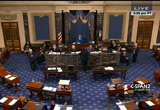tv Key Capitol Hill Hearings CSPAN November 5, 2013 4:30pm-6:31pm EST
4:46 pm
ms. mikulski: mr. president? the presiding officer: the senator from maryland. ms. mikulski: mr. president, i ask that the call of the quorum be scraicted. the presiding officer: without objection. ms. murkowski: mr. president, what is the pending business before -- ms. mikulski: mr. president, what is the pending business before the senate? the presiding officer: we're on the motion to proceed to s. 815. ms. mikulski: mr. president, i ask unanimous consent to speak 10 minutes as if in morning business. the presiding officer: without objection. ms. mikulski: thank you very
4:47 pm
much. mr. president, i come to the floor today to really speak about how we could avoid another shutdown of our government and also even more important, avoid another shutdown or slowdown of our economy and that's how we in the congress, both sides of the aisle, both sides of the dome need to work to arrive at a budget agreement and then an appropriations agreement for the rest of the fiscal year. earlier today on the floor, we heard from the distinguished chair of the budget committee, the gentlelady from washington state, patty murray, to talk about the budget and what was going on. i come here today to support her reference and the work of the budget conferees as they work to
4:48 pm
reach an agreement on the funding levels that will invest in america's future, creating jobs, repairing infrastructure, keeping us safe in our communities, and making sure that our children are well educated for the 21st century. the budget conference is absolutely important to america's future because it's how much should we invest in america's future, what should we do in terms of revenue, how do we close corporate loop -- corporate loopholes and corporate welfare, and also have them step up to their patriotic responsibility, and also what is the best way to approach the funding for this government. mrs. no doubt that we need to -- there is no doubt that we need to reduce public debt, but
4:49 pm
austerity alone is not the answer. we've seen it in europe, where, yes, they've reduced their public debt but they have not been pro-growth. the agenda that i stand for, and i know that the chair of the budget committee does and many of us on both sides of the aisle is, we not only want to reduce public debt, we also want to reduce unemployment. and we also want to reduce things like -- we want to -- like crime rates. so we need to be able to work together. my goals for the conference committee that's meeting are simple and straightforward. i would like to see the budget committee come up with not only a one-year framework but a two-year framework, giving a top-line funding level for 2014 and 2015, and replacing the sequester policy for at least
4:50 pm
two years. and to do that with increased revenues and strategic cuts, a balanced approach. now, let me say why this is important, because many people do not understand the difference between the budget committee and the appropriations committee. the budget committee looks at the entire budget of the government of the united states of america. money out and money in. so it looks at money out in two categories: discretionary spending. that's the appropriations committee. mandatory spending. that's social security, that's medicare, that's veterans benefits. and then the other is revenue in, either through trust fund contributions or through fees or through taxes.
4:51 pm
the so-called top line is what discretionary spending is -- is what they allow for discretionary spending. in the budget, it's under an act called section 308 of the budget. i, in order to do my job as the chair of the appropriations committee, need the budget committee, with the concurrence of the congress, to give both my counterpart in the house, congressman rogers and nita lo lowey. myself and vice chairman on the other side of the aisle, senator shelby, the so-called top line. then we work through our other 12 subcommittees. this is absolutely crucial because we cannot do discretionary spending for fiscal 2014 until we hear from the budget committee. and we don't want another c.r. we don't want another shutdown. we don't want another slowdown. we're ready to go to work.
4:52 pm
we've already done our due diligence. we've already worked our -- worked through the subcommittees, 12 subcommittees, looking at what public investments should be made, and, by the way house, we can be more friewg -more -- by the way, how committee with be more frugal, what is necessary and what is dysfunctional. and working with the cochair of the committee, senator shelby, the distinguished gentleman from alabama, my vice chairman, we look at what we is available to spend and what we can get rid of elm they've done a great job this year. i'm really proud of. they and by august 1, all of my subcommittees were marked up but we really need to have this agreement. so we say, we need to have this agreement and we need to have it sooner rather than later. now, in the deal, the budget committee is to report out to the congress and, therefore, to the appropriations committee by
4:53 pm
december 15. i, with my committee and my counterparts in the house, are to produce an appropriations omnibus by january 15. i don't want to get lost in words in the weeds here, but essentially, as it stands now, congress will only be in session eight days from december 15 to january 15 because of the holidays. eight days is an awful lot to ask barb mikulski and richard shelby and hal rogers and nita lowey and our wonderful subcommittees to be able to produce a bill. so we'll do it if we have to but we would prefer sooner rather than later. we feel so strongly about it that my house counterpart, congressman hal rogers, a distinguished gentleman from kentucky -- and i say
4:54 pm
"gentleman" in the true sense of the word -- civil, candid, straightforward, courteous. we've talked about issues. there are differences in fiscal approach and so on, but we know how to get the job done. where we differ, we know how to resolve the conflicts and we're ready to go. we have issues -- we have sent a letter to the chair of the budget committee on both sides, to senator murray and to paul ryan, asking that they report to the congress before the thanksgiving recess. before the thanksgiving recess. this was unprecedented. now, we didn't talk about dollars. that's the budget committee. we will take our pot of discretionary money called the top line and get it done. what both the house chairman and i are really worried about is that if we don't act, sequester
4:55 pm
kicks in january 15. what an awful way to do business in our government. you heard how i said my subcommittee chairmen have worked to look at what is dated, duplicative and dysfunctional. that's just not meant to be an illiterative concept. it was a policy, both sides of the aisle scrutinizing. and i'm just worried. when i look at defense, funding for defense would be $54 billion lower under the senate's version in both defense and military construction. according to the military chie chiefs, the readiness of our force has been degraded under existing sequesters. 85% of army brigade combat teams won't be fully deployed. the navy and our marine corps will only have one carrier strike group and one amphibious ready group. they're always going to be sejm
4:56 pm
sempre fi, but we've got to be that way too and also faithful to getting the job done. the air force will have to cut aircraft and possibly an entire -- an entire fleet. this is a dangerous time in the world, with numerous threats to our security, and we can't operate our military on the cheap. and just to give you a sense of what furlough meant, over 650,000 national security employees were initially furloughed, both in defense and intelligence and in other security positions in key government agencies. this is unacceptable. you can't protect a country and run a government like that. i chair the commerce-justice subcommittee. that's the committee that funds federal law enforcement, f.b.i., drug enforcement, u.s. marshals, the u.s. attorneys that actually move this, the bureau of alcohol and firearms. it keeps us safe from terrorism.
4:57 pm
it catches child predators, prosecutes drugs -- drug dealers and gangs. you know, think of how the f.b.i. went after the boston marathon killers. the c.j.s. bill adds $2.3 billion above sequester levels to allow federal law enforcement to do their job. u.s. marshals track down violent fugitives and sex offenders. d.e.a. goes after not only drug dealers but international drug cartels so it doesn't make it to the playground or to the schoolroom. the new f.b.i. director recently announced that if sequester continued, the f.b.i. will have to furlough people up to 10 days over the next year. this is not good. in the long term c.r. at the sequester level, a continuing
4:58 pm
resolution will fund -- they will keep a hiring freeze of over 3,000 positions. you can't have the kind of law enforcement we need at those levels. so, mr. president, i just say this. we have a big job to do. we have to do it sooner rather than later. i really ask the support of the congress to the budget committee, for them to really be able to bring a budget to the floor. let's try to do it before the thanksgiving break. let's look at how we can look at a balanced approach between strategic cuts. and we on the appropriations committee are ready to keep on doing the job that we started almost seven years ago under senator byrd, our wonderful, most beloved leader of west virginia, senator inouye, senator stevens.
4:59 pm
we need to keep on doing that but we need the budget committee to do their job. the impact on national security is really significant. the impact on our domestic economy is really significant. we need to be able to step up to the plate and not only avoid a crisis, like a shutdown, we also have to avoid the crisis of confidence that's occurring in our government. can they govern, can they get the job done? are there significant pragmatist as that will really look at what is the must-do list we have around spending, of which i think security for our country is at the top of the list? and i believe we can do it. i know the presiding officer was part of a bipartisan group during the shutdown to try to find a compromise. that group, i salute them. they changed the tone, showed civility, showed bipartisanship,
5:00 pm
and i think their initial effort was enough to stimulate and encourage them coming to the final resolution that we did. that's the kind of spirit we need in the body. and i just say to my colleagues, let's have the budget committee act sooner rather than later. let's support them in a balanced approach to not only look at austerity but also growth, and that also means closing corporate loopholes. so, madam president, i welcome you to the chair. and i think that concludes what i wanted to say today but as we get ready to approach the holidays, i want the american people to have confidence in their government and i want the membership to have -- american people to have confidence in those of us who have been elected. a big election day all over america, and i just recall this time last year the re-election
5:01 pm
of president obama, the election of the gentlelady from massachusetts, the presiding officer, today. it was a big day. it was a big deal. 20 women came to the senate. a new democratic woman, a distinguished just woman from the state of nebraska, and when they came forward with excitement, filled with passion to serve the nation, represent and be the voice of the people in their state and to get something done, and not only to do it in the lowest common denominator but also to be able to work together for the common good and worry about the next generation, not the next election. that's what we did. let's recall how we felt this time last year. let's get our act together and press on. madam president, i yield the floor.
5:04 pm
ms. mikulski: madam president? the presiding officer: the senator from maryland. ms. mikulski: i was so excited talking about my topic i forget to note when i concluded the absence of a quorum, so i thereby ask to note the absence of a quorum. the presiding officer: the clerk will call the roll. quorum call:
5:14 pm
a senator: madam president? the presiding officer: the senator from connecticut. mr. blumenthal: thank you, madam president. i ask that the quorum call be vacated. the presiding officer: without objection. mr. blumenthal: thank you, madam president. madam president, in 2005, may of that year, the senate faced a crisis that seems very familiar and very much like the one we face today in this body. very simply, the senate was unable to approve judges which threatened to incapacitate a co-equal branch of our government, the united states judiciary, and it confronted the threat of what came to be called the nuclear option. a change in the rules that would have wrecked the collegiality and civility that has characterized this body. members of both parties
5:15 pm
recognize that the situation is untenable, and they recognize as well that the american court system was too important for the senate to simply stop approving judges. and suspend that very important constitutional responsibility on behalf of this body. at the time, 14 senators came together to find a solution. they came to be known as the gang of 14, seven republicans and seven democrats, and i want to read their names for the record because i think their conduct here characterized what is really perhaps best about this institution. they were senators robert byrd, of west virginia, lincoln chafee of rhode island, susan collins of maine, mike dewine of ohio, lindsey graham of south carolina, daniel inouye
5:16 pm
of hawaii, mary landrieu of louisiana, joseph lieberman of connecticut, john mccain of arizona, ben nelson of florida, ken salazar of colorado, olympia snowe of maybe and john warner of virginia. what they devised was a quite simple solution. they were grappling with the same question that confronts us now, what can justify a member of the united states senate voting to block consideration, in other words, to filibuster, a nominee to the judicial branch. and their idea, simple as it was, had tremendous power. they agreed they would oppose a judicial nominee only in, quote, extraordinary circumstances.
5:17 pm
that was the gist of the agreement, there were other features to it but their spirit and intent in this short phrase had profoundly meaningful impact. in fact, for the remainder of the bush presidency, there were no more filibusters on judicial nominees. and those senators with that short phrase accomplished a historic impact. what did they mean by it? as one of them said at the time, -- quote -- "ideological attacks are not an extraordinary circumstance. it would have to be a character problem, an ethics problem, some allegations about the qualifications of a person, not an ideological bent" -- end quote. an ethics problem, a character problem, some allegations about
5:18 pm
the qualifications of a person. today, madam president, i ask for a renewed and revived commitment to the spirit of that agreement, a reinvigorated effort to apply that standard. and offer to work with my colleagues to revive that spirit of opposing a nominee and blocking that individual only in an extraordinary circumstance. and i come to the floor today because we have heard objections to a number of nominees on the basis of claims that clearly cannot constitute an extraordinary circumstance. opposed through that 60-vote
5:19 pm
threshold, a the filibuster, just last week were a number couple of nominees that clearly had qualifications to serve on the court of peels for the district of columbia circuit. i rise in support today of another, cornelia pillard. whatever has been said about this process, we have heard no extraordinary circumstance to oppose any of these nominees, and certainly not ms. pillard. senators can always disagree about exactly what our courts should do and how we should divide and allocate resources and the claim has been made here that the reason to oppose those nominees is that there is insufficient workload to justify them. the fact of the matter is that this congress has approved the positions that are vacant and that they have been nominated to
5:20 pm
fill. i know that a lot of my colleagues have opinions on how to structure the court and what the workloads should be. but i would assume that these differences of opinion do not amount to extraordinary circumstances. they happen all the time. we debate what the workloads of the court should be. and certainly the job of this senate and of every senator is to advise and consent on judicial nominations. if we refuse to consider the qualifications of a nominee and if we make the judgment based on irrelevant consideration, we're failing to advise and consent. we can debate about the structure and the workload and the number of cases before a
5:21 pm
court, but they are not extraordinary circumstances. and the fact of the matter is that the workload of this court well justifies these nominations. in fact, it has grown in number since nominees were last approved. the waiting time for decisions on cases makes it eighth out of the 12 circuit courts. the cases themselves can't be judged only by the numbers, by the sheer volume of the caseload the senate in my view has to look also to the complexity and difficulty of the caseload. i've argued before this circuit court and i've participated in cases like the microsoft appeal appeal, which took months, in fact, years to resolve from
5:22 pm
start to finish and involved precedent-setting issues and decisions by the circuit court. and literally hours of argument. so the argument in my view about workload and about the need to fill or leave vacant, as the opponents say, that -- those vacancies is incorrect and wrong. and agreeing with me are the judicial conference and a majority of their colleagues who also say the vacancies should be filled, as do judges from across the political spectrum and appointees of a lot of different presidents, but the point here is that disagreement
5:23 pm
or even the claim that the workload doesn't justify it is not an extraordinary circumstance and that all to be the standard consistent with the gang of 14's agreement. now, i happen to believe that cornelia pillard is almost the ideal nominee. if you were to design someone, if you had that ability on the basis of record and talent and temperament, i don't think you could do much better. the district of columbia court is said to be the second highest court in the country. i think they are all the second highest court. i don't think any one of them is better than the other. the and, by the way, i don't think the decisions are more difficult in one circuit necessarily for judges than another. but what we want is an individual in each of these judgeships who is worthy of the
5:24 pm
immense responsibility because for most litigants the circuit court is the last stop on the litigation course. and cornelia pillard brings to this nomination not only brilliance in an academic sense but a variety of experience and a record of thoughtful engagement with diverse views, a dedication to excellence and to public service. she has spent time in the classrooms as well as the courtrooms and she is a civil rights hero as well as a public servant and an expert on the judicial system. in other words, if you had to design someone with a record and experience that is ideal for this court or any of the other
5:25 pm
circuit courts, you would pick nina pillard. i'm going to come back to the floor, i'm going to speak about her, i'm going to speak about this court, i'm going to speak about the gang of 14, and i'm going to speak about what should justify blocking a nominee of the president of the united states to serve in the courts. but for now let me just say about her, i hope that my colleagues will listen to her qualifications, to listen to her story and listen to the better angels of their natures. the present situation cannot stand, and if we continue on the present course, we will arrive at the same juncture that existed in may of 2005 when the
5:26 pm
gang of 14 helped to save the senate from a crisis. it would have been a crisis for the collegiality and civility of this institution, it would have been also a crisis for the country. and i hope that we can again avoid it. if we permit this process to move forward and recognize that there is no extraordinary circumstance for any of these nominees that should block their approval by the united states senate. thank you, madam president. i yield the floor.
5:28 pm
ms. murkowski: madam president? the presiding officer: the senator from alaska. ms. murkowski: request permission to speak as if in morning business. the presiding officer: without objection. ms. murkowski: thank you, madam president. this morning in the help committee we had an opportunity to hear from the administrator of the health exchange, ms. tavenner who came before the committee to talk about where we are in the process now with the exchanges that have been set up through the affordable care act. and it was an opportunity in the five minutes that we have allocated to each of us to pose questions to speak to the situation in alaska as it relates to the exchanges. and i come to the floor this afternoon because there was so
5:29 pm
much that i as one senator had to say that you can't possibly condense into a five-minute exchange, but it did cause me to -- to want to take a moment to speak about what's happening on the ground in the state of alaska. i think it's probably not an unfair assessment to say that most of the constituents that i am hearing from are not supportive of the affordable care act, and have been very skeptical about what benefits may come to our state. we are a high-cost state, high cost when it comes to health care and high cost when it comes to our insurance premiums. right now we are number two in the nation in terms of the premiums that alaskans pay.
5:30 pm
and so as much as alaskans might not like the affordable care act, i hear very clearly their expressions of concerns about making sure that we are working actively and aggressively to reduce the cost of health care, to increase access to providers, and to increase access to insurance that is affordable. but affordability is such a key factor in what we face. i had a chance to query ms. tavenner about the situation that we're seeing in the state of alaska right now with regard to enroll 0ments within the exchange. the state of alaska has opted not to have its own state exchange. they're part of the federal
5:31 pm
exchange. an organization called enroll alaska which was established to provide for outreach, education and enrollment of alaskans into the federally facilitated marketplace, i met with a representative from enroll alaska just about ten days or so ago. it was just about the 27th of october, i believe, and at that point in time was informed that there was one alaskan that had been successfully enrolled. i met with the navigators for the alaska native tribal health consortium, united way, providence hospital. they confirmed that no one has been successfully enrolled at that point in time. move it forward to yesterday, as of yesterday it has been confirmed that enroll alaska, the entity that has been set up specifically to advance enrollment within the exchanges,
5:32 pm
has been able to enroll just three individuals and has not been able to confirm that anyone else in the state has been successfully enrolled. so as folks are talking in different parts of the country about what's happening, they're using numbers -- several thousand, several hundred initially, but it has been not only surprisingly slow, astonishingly slow to the point where people are saying is it even open? let me suggest that in alaska, things are not really open right now. enroll alaska made a determination last week that they had discovered that the f.f.m., the federally facilitated marketplace, was calculating the subsidy for
5:33 pm
alaskans incorrectly. and so due to this, they suspended all their enrollments until this issue was resolved. i brought this up with the administrator in committee this morning. she acknowledged that in fact they had learned that perhaps the calculation was incorrect and that they were -- quote -- "working on it." well, in the meantime you have folks that are interested in signing up, wanting to avail themselves of the affordable care act or one of the 5,600 who received a letter on friday telling them that their insurance with premiera was going to be canceled at year end and being told that in fact you can sign up for what premiera watts going to offer -- was going to offer, but in looking at that they're learning that not only were their premiums
5:34 pm
going to increase but in many cases they will double and their deductible will increase. they want to know will i get a better deal on the exchange. the problem is not being able to access to utilize to gain the information when the entity that has been set up to help facilitate this says that they have suspended all enrollments until this issue is resolved and further going into their letter that was received last week, they say "we ask for the obama administration to pull the web site down, rebuild it and redeploy it." again, these are entities that are banking on the exchange to work. they want to help facilitate it. and things are as confused and complicated and, quite honestly, a mess with the exchange. up north, they're saying we're not going to -- we're not going to push further if we're not
5:35 pm
certain that the subsidy is being calculated correctly, it's not right to tell people that you can sign up in the state of alaska right now. so the exchanges, we recognize are a mess. and they need to be addressed. i think we have recognized that at some point in time they will be addressed. they will be corrected. the administrator has indicated that between 1:00 a.m. and 5:00 a.m. eastern standard time the exchanges are going to be down so that they can work on it, so that they can be addressing these software glitches. well, 1:00 a.m. to 5:00 a.m. eastern standard time, for those of us that are living on the west coast, this is about the time when the dinner dishes are done, the kids' homework is done, they're in bed.
5:36 pm
you can actually sit down at your computer and go online and try to figure out what might be the best option for you on an exchange. but we're being told that the exchange is going to be down between the time that most alaskans and certainly hawaiians that are time hours five difference instead of the four hours that alaskans are, that are not going to be able to go online and to address it there. that's one aspect of it, is where we are with the exchanges and what that's going to mean if we're still going to continue with the deadlines that have been put in place by the administration in terms of when you have to sign up by and when you may be assessed a fine or a penalty for failure to successfully enroll. i mentioned that on friday there
5:37 pm
were some 5,600 alaskans actually -- excuse me. 5,360 alaskans who received discontinuation notices from premiera. premiera is the largest health insurer in alaska. this represents about 60% of the folks that premiera ensures within the state in terms of its individual members. so when you think about these folks that have now received their letters this weekend, recognize that the policies that they have had for a period of time are not going to be available to them, they read in the news and they see on the evening news that the ability to get online and to better understand what's going on with the exchange is not available to
5:38 pm
them because the exchanges are down while they're working on them here in washington, d.c., or wherever they're working on them, and that the entities, the navigators, the enroll alaska, those that have been put out there to help them navigate this process, are effectively saying we can't enroll you right now, and we won't until there is greater assurance that the system is up and running and working, and the administrator has confirmed to us today that, well, we're working on it. but in the meantime we still have these deadlines that folks are facing. the e-mails that have been coming to my office of late, though, have not been concerns with the exchange themselves. what we have seen in the past few weeks has been a concern, an
5:39 pm
outcry about what people will be expected to pay for their insurance once all aspects of the affordable care act come into play. now i mentioned already, madam president, that alaska faces the second-highest premiums in the country. we're high for a lot of things, though. our energy costs are some of the highest in the nation. our transportation costs are some of the highest in the nation. our food costs are some of the highest in the nation. our health care costs are some of the highest in the nation. and now our premiums are going to be some of the highest in the nation. but we recognize that to live in alaska, it's expensive. so when you look at the average wages of an alaska, they're a little bit higher than you might see in other parts of the country. that's a good thing.
5:40 pm
that's going to help you pay for your transportation, for your fuel, for your food. but when we're talking about any level of subsidy, this is a concern that we're seeing around the state. the higher income levels are going to kick you out of being eligible for any level of subsidy. so we've got -- we've got alaskans that are trying to be diligent about their health care and the insurance, wanting to be able to provide for their family. and they're trying to figure out where do i go. i've got a letter here from a gentleman in fairbanks. he runs a small knife and tool shop there. he's indicated that he has -- he was on premiera. he got the notice that they were not going to continue his
5:41 pm
coverage. new policy with them, the least expensive that he could get was going to cost $1,260, up from $575. this is an over a 60% increase that he is going to experience. on top of that, his deductible is also going up from $5,000 to $6,300, an increase of about $2,700. got an e-mail from a woman who is in the 55-and-above age bracket, she says. she says "we make a decent income, and so we won't be eligible for the subsidies. we have looked at this." but she said that they're going to be seeing premiums of over $1,500 a month. she says "this is more than our mortgage. this is like taking on a second mortgage." and also in her situation, she
5:42 pm
says "my deductible has gone from $5,000 to $6,300. so deductibles are going up. premiums are escalating." and this woman says, you know, am i going to be in a situation where it's just going to be cheaper for me to pay the fines? so i started going back through the binder that i have utilized to collect the e-mails from alaskans over the past few weeks here. a woman in anchorage says that her rates are going to increase 23% from last year. a woman from tawkeetana says it is an increase of 14%, a $10,000 deductible. but she is going up by 47%. out in wasilla this woman
5:43 pm
indicated i calculated we're expected to have an increased monthly premium of 224%. our premiums will be exceeding our mortgage by more than $300 a month. william in anchorage says that his health insurance has gone up 115%. out in anchorage, a woman is facing an increase in premiums of 45%. and again, she has indicated that she's been informed that she's not going to be eligible for any level of tax, of a subsidy. the gentleman in this e-mail, anthony out of valdez, has said he's looking at an 85% increase in his premiums, and that's just over, over the past four months,
5:44 pm
. he's a single guy. he's 41 years old. he says "i'm healthy. i've got money in my savings account.." but he's got a situation where he's going to be paying an 85% increase in his medical insurance premiums. and, you know, i go through these -- these aren't statistics. these are addressed to -- i know this is not about you, lisa murkowski, but about representation for the people of alaska. address this. they're asking me to help them out because they can't afford the affordable care act. and so i go through each of these, and whether it's the
5:45 pm
folks in petersburg who are a 25-year-old male, nonsmoker who had a $10,000 deductible, and he was paying $102 a month. now he is going to have to pay $281 with a $6,300 deductible. 35-year-old male nonsmoker paying $135 a month now has to pay $640. a 63-year-old male smoker paying $500 as of january paying $827. we go through these stories. these stories are people that we represent, whether it's tom or linda or teresa or chris or ma mark. they're saying, i thought what was coming our way with health care reform was reform that was going to increase my access and
5:46 pm
decrease my cost. frustration with the web site is one thing, madam president, and i am hopeful that we get on the other side of that very, very soon. the people of alaska are -- they're done holding their breath on this. they're basically saying, call me when you have it fixed. but what they're concerned about is they're going to get that call and we're going to be up against the end of the year, and they've already got their notices saying, we're not going to continue this coverage, and they're worried about, well, what happens if we do have a family medical emergency in early january and -- and this all hasn't knitted together? gi didn't get a very satisfactoy answer this afternoon in response to that question. i want to be able to have good answers to these people, but i am extraordinarily concerned that, as we address the issues with the web site, the issues
5:47 pm
that the people in alaska, who already face some of the highest costs for living in a stat in o, are going to be seeing increased insurance costs that will be out of their range, out of their ability to pay. and the subsidies that they would like to think would make a difference are not available to them. madam president, we have -- we have a great deal of work to do here in this congress to address health care reform, to address the driving costs that are making all of these stories that are coming to me and coming to all of us, saying, what are you going to do to address the concerns in my family, when i'm
5:48 pm
trying to figure out how i knit it all together? they want to know, at the end of the day, how -- how have we reformed health care? how have we made our costs lower and increased our access? i would suggest that we have p - i would suggest that we have much more work to do and i stand ready towor to work with my cols on this side of the aisle, on the other side of the aisle, in the other body. we can fight and argue about whether the web site -- the exchanges are going to work, are going to fail on their own; whether we need to push deadlines out. this is just one part of what we're talking about. we've got to be doing a better job when it comes to reining in the cost of health care itself,
5:49 pm
how we deal with the delivery system. we really haven't touched -- how we deal with those markets, like arks oalaska or other rural pla, because we don't have a very attractive market. it certainly would help us if we could purchase our insurance across state lines. how we work to make sure that when we have payment structures, that the incentives are in the right place so that we're not -- we're not encouraging inefficiency within a system. we have so much more that we need to be doing. and i would just encourage us, let's not lose sight of what we have to do in resolving our issues, as they reallot to -- ay relate to bringing down the cost of health care at the end of the day. i know m that my colleague from tennessee sheer on th is here o,
5:50 pm
and i would certainly yield to him and thaipg hi thank him fors leadership on the help committee and the very thoughtful issues that he raised this morning. thank you, madam president. mr. alexander: madam president? the presiding officer: the senator from tennessee. mr. alexander: thank you, madam president. i thank the senator from alaska for her excellent remarks. i was glad i was here to see them. seshe and the senator from massachusetts and i all were at the hearing this morning where the head of the center for medicaid and medicare services talked about the health care law. i thought the senator from alaska was especially cogent in pointing out the difficulties and the differences between those who live in alaska and their inability to connect to the services in the new health care law. if i remember correctly, she said only three have been able to enroll, and she pointed out the differences in time.
5:51 pm
i'd like to spend a few minutes reflecting on what happened this morning and what i said to the administration's witness. i began by telling her a story, a story about 16,000 tennesseans who have insurance through something called cover tennessee, a low-cost coverage state program. obamacare is canceling their policies, those 16,000 policies. cover tennessee apparently is an example of what the president has called "bad apples," an insurance plan that washington has decided isn't good enough for you. i recently heard from one of those tennesseans whose policy will be canceled on january 1. her name is emily. she's 39 years of age. she has lupus. she lives in middle tennessee. "i can't keep my current plan because it does not meet the
5:52 pm
standards of coverage. this alone," she say, "is a travtravesty. with the discontinuation of cover tennessee, i have been forced to purchase a plan through the exchange. my insurance premiums alone will increase a staggering 410%. my out-of-pocket expense will increase by more than $6,000 a year, that includes subsidies. please help me understand," she writes, "how this is affordable." madam president, our health care system makes up nearly 20% of the american comirks touching th-- americaneconomy, touching f nearly every american. today obamacare is pushing that 20% of our economy in the wrong direction. as the president has said, this law is more than a web site that won't work. it is a law transforming our health care system in the wrong direction by increasing premiums, canceling insurance
5:53 pm
plans, destroying relationships with doctors, raising taxes, forcing people into medicaid, spending a half trillion medicare dollars on a new program instead of using the money to make medicare more solvent and encouraging employers to reduce their employees to a 30-hour workweek, and having the i.r.s. threaten to fine americans for failing to sign for insurance on a web site that doesn't work. now, the president has promised -- and this morning i went on an ipad and read from the white house web site -- it does work -- and the president says a on that web site, if you like your health care plan, you can keep it as long as you don't have to change -- you can keep it, and you don't have to change a thing due to the health care law. it says, if you like your health care plan, you can keep it, and you don't have to change a thing
5:54 pm
due to the health care law. but, in fact, the law cancels millions of individual policies and for millions of others employers are dropping insurance programs as they discover the added cost of obamacare. for these americans, the new promise is, if you want health care, go find it on a web site that the administration says wilsays --says won't be workingl until the end of november. only two weeks to shop for an insurance policy so you're covered next year when obamacare outlaws your policy. this administration has three and a half years to set up the web site. millions of americans will have two weeks to buy their insurance. the president put secretary sebelius in charge of implementing this law. i have called on her to resign because this has hurt so many americans. before the internet, r.c.a.
5:55 pm
could tell you every day how many records elvis was selling. ford could tell you every day how many cars they were selling. mcdonald's would tell you every day how many hamburgers it sold. congressman issa put on his web site notes from the obama administration war room where they're telling each other how many people are enrolling in obamacare. i asked this morning if she knew how many people are enrolling, what level of insurance they're buying, what zip code they live in. why don't you tell us. why don't you tell congress. why don't you tell the american people. she said she would tell us by the end of the month. we need to do every day, madam president. we need to know every week at least. wouldn't it help to know how many of these new enrollees are going into medicaid? members of congress need to know. we've appropriated at least $400 million for this web site that
5:56 pm
doesn't work. the american people need to know. they might gain confidence in the system if they could see that every day more people were signing up for this or that. i can't get over the fact that we're not being told how many are enrolled, how many are trying, what kind of insurance are they buying, where do they live. we have a right to know that. why doesn't the administration tell us that? one senator has described the nur health care law as an -- one senator has described the new health care law as an approaching train wreck. i know something about trains. my grandfather was a railroad engineer in newton, kansas, when i was a little boy. his job was to drive the steam-engine locomotive on to what they called a round table, turn it around, and head it in the right direction. that was the only way you could turn something that big that fast.
5:57 pm
that's what our country needs to do. we need to turn this train around. the we need to turn this law around and head it in the right direction. obamacare is the wrong direction because it expands a health care delivery system that we already knew costs too much. what is the right direction? the right direction is more choices, more competition, that lowers cost so more americans can afford to buy insurance. now, don't expect republicans to show up on this senate floor with our 3,000-page plan to move the health care delivery system in the way we think it ought to go. we don't believe in that approach. we're policy skeptics, you might say. we don't believe these big, comprehensive plans are wise enough to do what needs to be done. instead, we believe we should change our health care delivery
5:58 pm
system step by step. i remember during the health care debate in 2010, i counted the number of times that republicans offered on the floor, set on the floor our step-by-step plan to take the health care delivery system in a different direction. 173 times just during 2010. and here are some of the steps that we suggested, and still do suggest, that we should take to turn the train around and head it in the right direction. make medicare solvent. the trustees have said that in ten years it won't have enough money to pay hospital bills. i know plenty of tennesseans who are counting on medicare to pay their hospital bills. reform medicare advantage to compete on a level playing field with medicare. that would provide competition, more choices for seniors. the congressional budget office says it would save taxpayers money.
5:59 pm
make medicaid flexible. when i was goafn o governor of tennessee, medicare was 8% of the budget. today it is 26%. as a result, governors have been told by washington to spend money on medicaid that instead they would rather spend on higher education. make medicaid more flexible. perhaps we can cover more people and set our own priorities. encourage employee wellness incentives. we talk a good game in the senate about that, but the administration's regulation actually limits the ability of employers to say to employees, if you have a healthy lifestyle, your insurance will be cheaper. that insurance provided by the employer. we should repeal that regulation, change it, make it easier for employers to encourage that kind of behavior and offer cheaper insurance. allow small businesses to pool
6:00 pm
their resources and offer insurance together. we call that small business plans. all of these steps, by the way, are in legislative form. they're bills we have introduced. they're steps we could take today if we had enough votes to pass turning the train around and heading it in a different direction. buy insurance across state lines. if americans could look on the internet and buy insurance across state lines that suited their needs, made those choices, perhaps more americans could afford insurance. and isn't that what we want to do? change the 30-hour work week to 40 hours. both democrats and republicans support this idea. i'm not sure where it ever came from but it's one of the worst features of obamacare. it says -- it creates a big incentive to cause businesses to
6:01 pm
reduce the number of working hours from 40 to 30 so their employees will be part time and want affected -- and the business won't be affected by the obamacare rule. well, that creates consternation within the business. it doesn't create good relations between the employer and the employee. but think about the employee. think about the pay cut from 40 hours to 30 hours. think about the employee going out and finding another part-time job at, say, another restaurant. why not give these employees a 33% pay increase? that would be a pretty good way to get up above the so-called minimum wage and give businesses a chance to have full-time employees again. so these are all steps that would change the health care delivery system by changing its direction away from expanding a health care system that we know already costs too much and send it in the direction of choice
6:02 pm
and competition and finding ways to lower the cost of health care plans so more americans can afford to buy insurance. that 39-year-old tennessee woman who i talked about this morning to miss tavenner, the woman named emily, who's losing her insurance because obamacare has decided thank -- c c that thatt good enough for her. finished her story with this quote. "this is one of the biggest betrayals of our government that has ever been committed on its citizens. i beg of you to continue to fight for those like me who would only ask to be allowed to continue to have what we already enjoy -- a fair health insurance plan at a fair price. please find a way to return to affordable health care." one good way to do that is to put the president's words into law. if you like your health plan,
6:03 pm
you can keep it. senator johnson of wisconsin has offered that legislation. i cosponsor it, as others do. my message to emily is that i'm going to do my best to turn this train around and head our health care delivery system in the right direction so that she can buy and keep health care insurance that she can afford. i thank the president and i yield the floor, and i notice the absence of a quorum. the presiding officer: the clerk will call the roll. quorum call:
81 Views
IN COLLECTIONS
CSPAN2 Television Archive
Television Archive  Television Archive News Search Service
Television Archive News Search Service 
Uploaded by TV Archive on

 Live Music Archive
Live Music Archive Librivox Free Audio
Librivox Free Audio Metropolitan Museum
Metropolitan Museum Cleveland Museum of Art
Cleveland Museum of Art Internet Arcade
Internet Arcade Console Living Room
Console Living Room Books to Borrow
Books to Borrow Open Library
Open Library TV News
TV News Understanding 9/11
Understanding 9/11